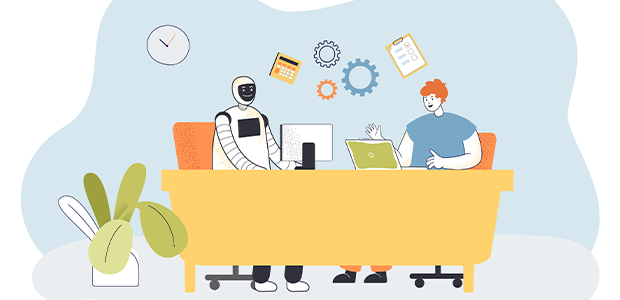
The benefits of AI on marketing and in the workplace
AI is already transforming our lives and particularly how we work. From physical work to creativity, AI is our new colleague - maybe one we are all a little wary of.
There are human traits that robots cannot replicate, such as emotional intelligence and critical thinking. Both are paramount when it comes to marketing. But, our work landscape is going to change.
Unsurprisingly, research has shown that more marketers than ever are using AI to their benefit - a 2023 Statista study revealed that 73% of U.S. marketers are already taking advantage of this new tech.
The benefits of AI in marketing are countless - it can help create compelling, stand-out content - one of the biggest hurdles for marketers in an oversaturated marketplace. Once that content is created, it can identify a brand's key demographics and then seamlessly collect the data that will show how well that specific content performed, which is invaluable to future campaigns success.
The biggest benefit of AI for marketers is its time-saving qualities. It can do time-consuming tasks in a matter of seconds, like drafting press releases and crafting personalised emails. It can also help with customer support by using chatbots, ad copy using platforms like Jasper or Copy.ai and predictive analysis with tools such as ChatGPT.
Our marketing environment is fast-paced and often we spend most of their time trying to keep up with emerging trends, changing algorithms and adapting to what consumers are looking for. The same goes for integrating AI into your marketing strategies. Marketing is all about not being left behind and keeping up with trends, so by embracing new technologies in an ethical way that adheres to your brands core values, you can further your capabilities and create a better work/life balance.
However, I am not suggesting that AI take over all of a marketers responsibilities. Finding a good balance between AI created content and human input is crucial. I use AI as a base or jumping-off point to then edit and add your personal creativity to it to make sure you’re still creating content that is unique to your brand and style of marketing and doesn’t feel mass-produced or impersonal.
However, in order to make sure these tools are actually benefiting you and your business, it is important to continuously check in on how this content is performing, which you can do by monitoring engagement metrics, conversion rates and general feedback.
If you ask ChatGPT itself, how AI can benefit the workplace, its top suggestions include, ‘Boosted Efficiency’,’Bolstered Security’,’Streamlined Recruitment’ and ‘Improved Employee Activity’. And although the tech may be biassed, it’s certainly not too far off the mark. Just like in the case of marketing, AI can take over time-intensive tasks and free up employees time so they can get more done and with data theft higher than ever, using AI to make sure your network is secure, isn’t too much of a bad idea, especially if your business can’t afford a full IT team.
Recruiting can be difficult, especially post Great Resignation and workplace trends such as ‘resenteeism’ and ‘quiet quitting’ taking over TikTok. AI-powered tools can automate candidate screening and initial assessments, which can ease the recruitment process and give you greater peace of mind when hiring. Further, there are many AI-powered assistants that can help individuals manage their tasks, schedules, and priorities more effectively, which will especially help employees that can become easily distracted or work flexible hours or WFH.
The landscape of marketing and the workplace in general is likely to change due to the progress AI has made in recent years. However, there are human processes and skills that robots cannot replicate, such as creativity, emotional intelligence and critical thinking.
In order to adapt to the AI boom, it is important to reconfigure your workplace accordingly. As time-intensive jobs are overtaken by AI, it’s crucial to invest in reskilling your employees, seek innovation where you can and ensure best and ethical practices are used when incorporating AI in the workplace.

